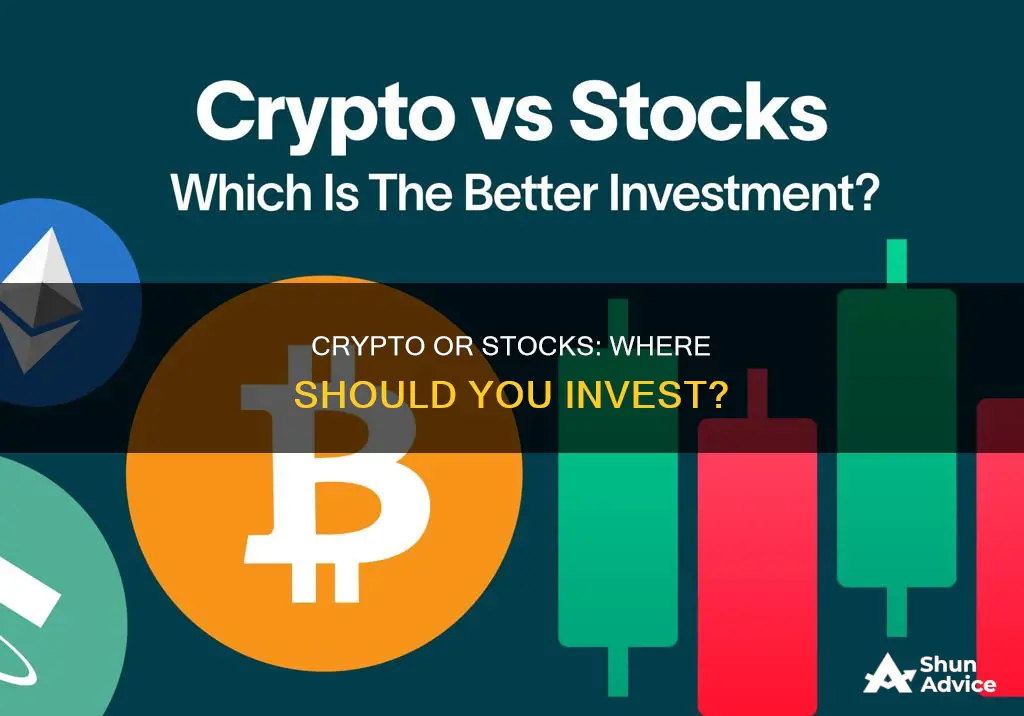
Cryptocurrency and stocks are two very different types of investments, each with its own pros and cons. So, what's the better choice for you as an investor?
Cryptocurrency is a digital or virtual currency that uses cryptography for security and is often decentralised and independent of centralised banks. It has a low barrier to entry, is highly liquid, and can offer substantial returns on investments. However, it is highly volatile, lacks thorough regulation, and is not widely accepted as a form of payment.
On the other hand, stocks represent fractional ownership of a company and are backed by the company's assets, cash flow, and earnings. They have a long history of producing solid investment returns and are heavily regulated by government bodies. Stocks generally offer more stable returns but may have lower potential for extreme gains compared to cryptocurrency.
The choice between investing in cryptocurrency or stocks depends on various factors, including your investment goals, risk tolerance, time horizon, and knowledge about each asset class. Cryptocurrency could be attractive to those seeking low barriers to entry and autonomy over their investments, while stocks may appeal to those who prefer the security of established markets and regulatory oversight. Ultimately, a hybrid approach that includes both assets in your portfolio may be the best strategy.
| Characteristics | Values |
|---|---|
| Accessibility | Crypto has a low barrier to entry, while stocks require more specialized knowledge. |
| Volatility | Crypto is highly volatile, offering potential for high returns but also high risk. Stocks are less volatile and tied to financial reports. |
| Regulation | Stocks are highly regulated and operate through established exchanges. Crypto has varied global regulation and lacks a regulatory framework. |
| Trading Hours | Crypto markets are accessible 24/7, while stocks are usually traded during regular business hours on weekdays. |
| Dividends | Stocks may offer dividends, while crypto does not. |
| Ownership | Stocks represent fractional ownership of a company, while crypto is a digital or virtual currency. |
| Value | The value of stocks is tied to the financial performance of a company, while the value of crypto is driven by market speculation and supply and demand. |
| History | Stocks have a long history of solid returns, while crypto is a newer asset class. |
What You'll Learn

Volatility and risk
Cryptocurrencies and stocks are both volatile and carry risk, but in different ways and to varying degrees. Volatility refers to the degree of price changes over time, and both stocks and cryptocurrencies can experience this. However, cryptocurrencies are far more volatile than stocks. Crypto prices can fluctuate wildly on a daily basis, driven by speculative trading and investor sentiment, rather than the underlying business performance. The degree of price changes is significantly higher in cryptocurrencies compared to stocks, making them much riskier.
Stocks, on the other hand, are generally less volatile and are tied to corporate earnings and financial reports. While they can fluctuate with business cycles and market downturns, they don't exhibit the same level of drastic price swings as cryptocurrencies. Stocks are also less volatile because they are tied to the financial performance of a company, whereas cryptocurrencies are not.
The extreme volatility of cryptocurrencies translates to a higher risk for investors. Fortunes can be made and lost quickly, and there is no telling where a coin's price will go next. Cryptocurrencies are not backed by any hard assets or cash flow, so their prices are solely determined by market speculation and sentiment. As a result, crypto investments are driven by the "greater fool theory of investing", which means that investors are hoping someone will buy their coins for more than they paid. This makes the investment success of cryptocurrencies highly uncertain and risky.
In contrast, stocks have a long history of producing solid investment returns and are considered safer than cryptocurrencies. Stocks represent ownership in a company and are backed by the company's assets, cash flow, and future earnings power. This gives stocks intrinsic value, which cryptocurrencies lack. Stocks are also heavily regulated and have investor protections in place, providing additional security for investors.
While stocks are generally less risky than cryptocurrencies, they are not without their own risks. Market volatility, poor management, international events, and industry trends can all impact the value of stock investments. Additionally, individual stocks can be more volatile than a diversified portfolio of stocks.
In summary, cryptocurrencies are highly volatile and carry a high level of risk due to their speculative nature and lack of underlying assets. Stocks, while less volatile, still carry risk and are subject to market and business-related fluctuations. The level of risk an investor is comfortable with will depend on their financial goals, risk tolerance, and understanding of each asset class.
Dogecoin Investment: Is It Worth Your Money?
You may want to see also

Liquidity
Stocks are generally considered to be liquid assets. They can be bought and sold on established stock exchanges, and there are usually a large number of buyers and sellers in the market, making it easier to buy or sell without significantly impacting the price. The stock market is also highly regulated, which adds to its liquidity.
However, it's important to note that not all stocks have the same level of liquidity. Stocks of large, well-known companies with high trading volumes tend to be more liquid than those of smaller, less popular companies.
The liquidity of cryptocurrencies can vary significantly. Cryptocurrencies trade on a 24/7 global market, and some of the more popular ones like Bitcoin and Ethereum are considered to have good liquidity. However, low-cap coins and tokens, or buying and selling on smaller crypto platforms, may have lower liquidity.
The cryptocurrency market as a whole is still relatively small compared to other financial markets, and it is less regulated than the stock market. This lack of standardised global regulation can make it harder to assess the true liquidity of a cryptocurrency.
Key Differences in Liquidity between Stocks and Cryptocurrencies
Stocks are generally considered more liquid than cryptocurrencies due to the higher trading volumes and more established and regulated nature of the stock market. However, cryptocurrencies can offer constant market access and the potential for high returns due to their volatility and newness.
Ultimately, the decision to invest in stocks or cryptocurrencies depends on an individual's risk tolerance, financial goals, and understanding of each asset class. Stocks are generally considered safer and more suitable for long-term investment horizons, while cryptocurrencies may offer greater potential for short-term gains but come with higher risk.
VVS Coin: A Smart Investment Decision?
You may want to see also

Market hours
One of the key differences between investing in crypto and stocks is their respective market hours. Unlike the stock market, which has set trading hours, the crypto market is open 24 hours a day, 7 days a week, 365 days a year.
Crypto Market Hours
The crypto market is always open for trading, even on weekends. This is because, unlike stocks, which are traded on regulated exchanges, crypto trading occurs on a decentralised network of computers. The only times crypto exchanges may be closed for trading are during periods of maintenance or due to security breaches, but traders are usually informed of these periods in advance.
While crypto can be traded at any time, there are optimal trading times when trading activity and liquidity are at their highest. Generally, crypto trading follows the hours of the stock market, with the majority of transactions occurring during global market hours. The best time to trade crypto is when the US market opens in the afternoon, European time.
Stock Market Hours
The stock market, on the other hand, has set trading hours that vary depending on the exchange. For example, the New York Stock Exchange (NYSE) and Nasdaq are open from 9:30 a.m. to 4:00 p.m. Eastern Time, Monday through Friday, with weekends and certain holidays off.
Advantages and Disadvantages
The 24/7 nature of crypto trading offers both advantages and disadvantages. On the one hand, it allows traders constant access to the market and the ability to trade at any time. On the other hand, it can be more challenging to enter and exit trades outside of peak hours when liquidity is lower.
The set trading hours of the stock market provide a more structured and regulated environment for trading. However, this also means that traders are restricted to operating within those specific hours, which may not always be convenient, especially for those in different time zones.
Getting Started With Crypto: Minimum Investment Requirements
You may want to see also

Regulation
The stock market has a long history of regulation and legislation. It is heavily regulated by government bodies, such as the Securities and Exchange Commission in the US, which provides certain investor protections. Stock exchanges, brokers, and companies are subject to strict rules and transparency requirements. This regulatory framework gives investors a degree of confidence and recourse in the event of issues.
On the other hand, the cryptocurrency market is relatively new and lacks a clear, established regulatory framework. The US government is still in the early stages of determining how crypto should be regulated. This lack of regulation adds a significant amount of risk to crypto investments. The absence of regulatory oversight also means that there are limited investor protections in the crypto space.
The regulatory future of cryptocurrencies is uncertain, and this uncertainty can be a deterrent for potential investors. Many investors prefer to wait until a clear rulebook is in place before entering the crypto market. Additionally, the lack of regulation can make it challenging to assess the legitimacy of crypto ventures, increasing the risk of fraud.
Furthermore, the regulatory stance on cryptocurrencies varies across different countries. While some countries have embraced crypto, others have placed restrictions or banned it outright. This variation in regulatory approaches can impact the accessibility and liquidity of crypto investments, depending on the investor's location.
It is worth noting that the regulatory landscape for cryptocurrencies is evolving. As the asset class matures, governments and regulatory bodies are working to establish appropriate guidelines and oversight. However, until comprehensive and consistent regulations are in place, the crypto market will continue to be perceived as a riskier investment option compared to the more established and heavily regulated stock market.
A Smart Guide to Bitcoin and Ethereum Investment
You may want to see also

Returns
Cryptocurrencies and stocks are both considered volatile, but crypto is the riskier investment. Crypto prices can fluctuate wildly on a daily basis, driven by speculative trading and investor sentiment. The degree of price changes is significantly higher than that of stocks. For example, in 2021, Bitcoin lost more than half its value in a few months and later gained 100%. Such volatility makes crypto unsuitable for short-term investors.
However, the potential for high returns in crypto is also much greater than in stocks. Due to its volatility and newness, crypto can offer substantial returns on investments, often outpacing more traditional asset classes. Several cryptocurrencies have seen their prices skyrocket since being introduced. These gains are the main reason people are attracted to cryptocurrencies.
The potential for price appreciation in crypto comes with significant risk. Fortunes can be made and lost quickly, and there's no telling where a coin might trade next. As crypto is not backed by any assets or cash flow, the only thing moving crypto prices is speculation driven by sentiment. As sentiment changes, prices shift – sometimes drastically. So, for a successful crypto investment, you must get someone to buy it from you for more than you paid for it.
Stocks, on the other hand, have a long track record of producing solid investment returns, with the S&P 500 stock index returning about 10% over the long term. Stocks are less volatile than crypto and are tied to corporate earnings. While they can fluctuate with business cycles, they don't exhibit the same level of price swings as cryptocurrencies. Stocks are also better suited to investors who can leave their money alone and don't need to access it.
Given its inherent risks, cryptocurrency works better with a small allocation in your overall portfolio – think 5% or less. Given stocks' strong long-term record, a diversified collection of stocks should make up the majority of your portfolio, especially if you have decades until you need to tap into it.
EGLD Coin: A Smart Investment Decision?
You may want to see also
Frequently asked questions
Stocks represent fractional ownership of a business, while cryptocurrencies are digital or virtual currencies that use cryptography for security. Stocks are highly regulated and operate through established stock exchanges, while cryptocurrencies have varied global regulation and trade 24/7.
Crypto offers a low barrier to entry, high liquidity, and independence from centralized banks. It also has the potential for high returns.
Crypto lacks thorough regulation, has a history of volatility, and isn't widely accepted as a payment method. It also poses cybersecurity and regulatory risks.
It depends on your investment goals, risk tolerance, time horizon, and financial goals. Stocks are generally considered safer due to their long history of solid returns and regulations, but crypto offers the potential for higher returns and constant market access.







